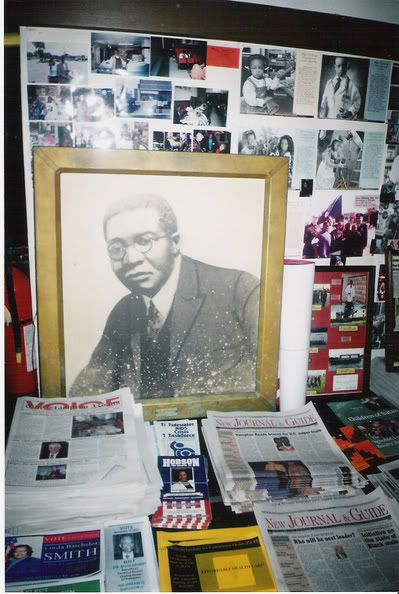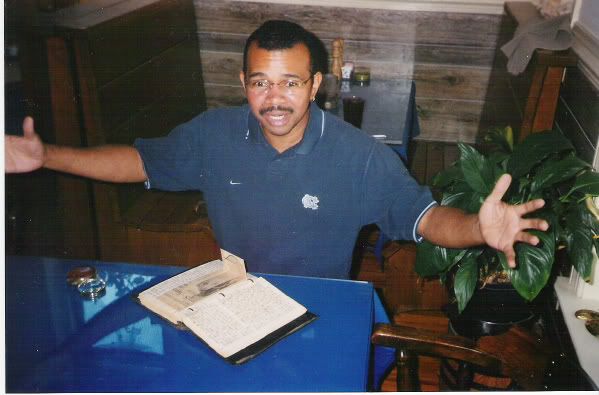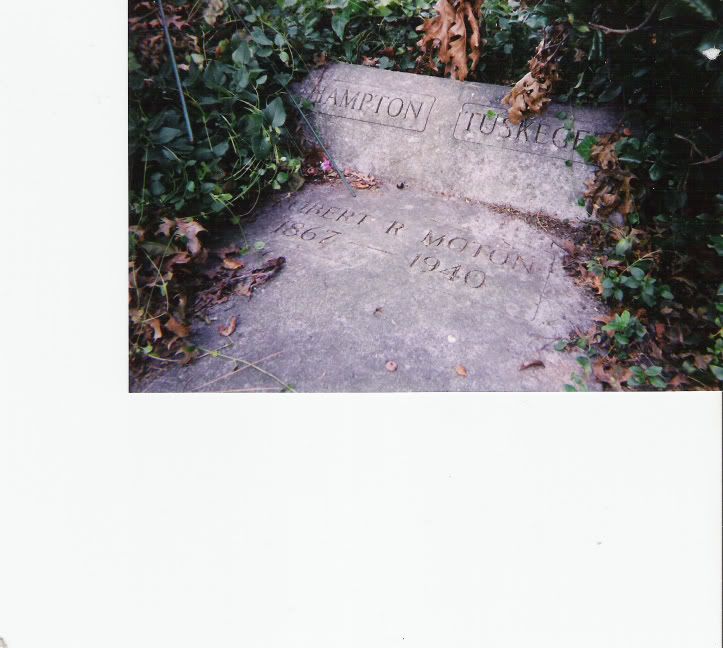Robert Russa Moton, A Forgotten Hero
Posted: February 4th, 2006, 9:56 am
Robert Russa Moton
A Forgotten Hero
By
Richard Moylan JR.
Shortly after slavery was abolished on August 26th, 1867 sharecroppers Booker and Emily Brown of Amelia County VA. gave birth to their only child, Robert Russa Moton. At the time his parents had no idea that their son Robert would become a famous African American figure who would change the way America viewed African Americans. As Robert Russa Moton grew he became serious about education and grew up to be a great educator. In 1885 at age eighteen he enrolled at Hampton Institute where he graduated in 1890. After graduating he stayed on at the institute as Commandant in charge of discipline. He kept that position for twenty-five years.

A portrait of Moton I uncovered behind some boxes at The Moton Community House in Newport News VA.
After leaving Hampton Institute, Moton following his dream of educating African Americans ended up at Tuskegee Institute in Alabama where he was named president of the institute following the death of Tuskegee’s founder and President Dr. Booker T. Washington. While at Tuskegee his efforts expanded the institute and academic levels of learning to include agriculture and medicine. Until then African Americans were unheard of in the medical profession.
In 1918 while still at Tuskegee Robert Russa Moton was called upon by President Woodrow Wilson to inspect African American troops stationed in France during the first world war. Unfortunately in most war situations, crime and rape were an issue that had to be addressed. In the 1900’s white soldiers would not fight side by side with African Americans but the French would. The French however blamed all the crime that occurred on the African American soldiers and this created unsettling relations between France and the United States. Robert Russa Moton returned to the States with success not by straightening out the French but by teaching African American Soldiers how to conduct themselves in France by staying to themselves, not going out alone and of course staying away from the French ladies. This kept blame away from the African American soldiers. Through his successful actions Moton was well accepted at the White House and became an adviser not to one but five presidents on race relations. I don’t believe today there is any one that has advised five presidents. Those presidents were Woodrow Wilson, Warren G. Harding, Calvin Coolidge, Herbert C. Hoover, and Franklin D. Roosevelt. There is a story that dictates one day in the mid 30’s Moton arrived at his lawyer’s house George P. Dehardit of Gloucester County and requested that George take a ride with him. A few hours later they arrived in Washington D.C., drove right through the gates of the White House and up to the front door where Robert Russa Moton was greeted as if he lived there. Now this alone was one great accomplishment for an African American of the times.
Not only was Moton an educator, diplomat, and presidential advisor he also excelled in business investing wisely in African American businesses. When one travels around you might see his name most anywhere. Schools are named after him, a local theater marques his name. Moton Air field is where the Tuskegee Airmen trained, The Moton Conference Center (Holly Knoll) in Gloucester VA. has been a meeting place for many African American leaders and Moton’s retirement home which he had built in1935.
Moton is also a published author with two books under his belt, Finding a Way Out, 1920 and What the Negro Thinks, 1929.
On May 30, 1922 Moton was honored as one of the speakers for the dedication of the Lincoln Memorial and for his contributions to humankind. He earned many honorary degrees from various institutions and was awarded the Harmon Award in Race Relations followed by another award in 1932, the Spingarn Medal.
After his retirement from Tuskegee in 1926 Moton and his wife Jenny Dee Booth Moton took a trip around the world I believe to promote civil rights and to strengthen foreign ties with the United States. This year long trip is not in the history books for not many are aware it took place. Recently a diary believed to be written in the hand of Jenny Dee Booth Moton was discovered and has daily entries, post cards, steamship passenger lists, newspaper articles reporting on Moton’s visits and of course photos. In the diary it is clear that Moton and his entourage were treated as royalty while entertained by kings emperors and heads of state. Once again this accomplishment for an African American of the times was just un heard of.

Phillip J. Merrill, African American appraiser for the Antiques Road Show expressing excitement over the rare and priceless Moton diary.
Moton finally retired in 1935 in Gloucester County, the home of his wife where he had his estate built on the York River. He lived in Gloucester until he past away in 1940. Today Robert Russa Moton rests at Hampton Institute where he is all but forgotten. I recently visited his grave site only to find it in need of care. Both his and his wife’s graves were obviously un kept. They were so grown over I almost over looked them. I find it sad that such a great man, a leader would be so quickly forgotten. When I was inquiring as to where Moton’s grave was the reply I got was “Moton who?”

Moton grave site, Hampton Institute.
A Forgotten Hero
By
Richard Moylan JR.
Shortly after slavery was abolished on August 26th, 1867 sharecroppers Booker and Emily Brown of Amelia County VA. gave birth to their only child, Robert Russa Moton. At the time his parents had no idea that their son Robert would become a famous African American figure who would change the way America viewed African Americans. As Robert Russa Moton grew he became serious about education and grew up to be a great educator. In 1885 at age eighteen he enrolled at Hampton Institute where he graduated in 1890. After graduating he stayed on at the institute as Commandant in charge of discipline. He kept that position for twenty-five years.

A portrait of Moton I uncovered behind some boxes at The Moton Community House in Newport News VA.
After leaving Hampton Institute, Moton following his dream of educating African Americans ended up at Tuskegee Institute in Alabama where he was named president of the institute following the death of Tuskegee’s founder and President Dr. Booker T. Washington. While at Tuskegee his efforts expanded the institute and academic levels of learning to include agriculture and medicine. Until then African Americans were unheard of in the medical profession.
In 1918 while still at Tuskegee Robert Russa Moton was called upon by President Woodrow Wilson to inspect African American troops stationed in France during the first world war. Unfortunately in most war situations, crime and rape were an issue that had to be addressed. In the 1900’s white soldiers would not fight side by side with African Americans but the French would. The French however blamed all the crime that occurred on the African American soldiers and this created unsettling relations between France and the United States. Robert Russa Moton returned to the States with success not by straightening out the French but by teaching African American Soldiers how to conduct themselves in France by staying to themselves, not going out alone and of course staying away from the French ladies. This kept blame away from the African American soldiers. Through his successful actions Moton was well accepted at the White House and became an adviser not to one but five presidents on race relations. I don’t believe today there is any one that has advised five presidents. Those presidents were Woodrow Wilson, Warren G. Harding, Calvin Coolidge, Herbert C. Hoover, and Franklin D. Roosevelt. There is a story that dictates one day in the mid 30’s Moton arrived at his lawyer’s house George P. Dehardit of Gloucester County and requested that George take a ride with him. A few hours later they arrived in Washington D.C., drove right through the gates of the White House and up to the front door where Robert Russa Moton was greeted as if he lived there. Now this alone was one great accomplishment for an African American of the times.
Not only was Moton an educator, diplomat, and presidential advisor he also excelled in business investing wisely in African American businesses. When one travels around you might see his name most anywhere. Schools are named after him, a local theater marques his name. Moton Air field is where the Tuskegee Airmen trained, The Moton Conference Center (Holly Knoll) in Gloucester VA. has been a meeting place for many African American leaders and Moton’s retirement home which he had built in1935.
Moton is also a published author with two books under his belt, Finding a Way Out, 1920 and What the Negro Thinks, 1929.
On May 30, 1922 Moton was honored as one of the speakers for the dedication of the Lincoln Memorial and for his contributions to humankind. He earned many honorary degrees from various institutions and was awarded the Harmon Award in Race Relations followed by another award in 1932, the Spingarn Medal.
After his retirement from Tuskegee in 1926 Moton and his wife Jenny Dee Booth Moton took a trip around the world I believe to promote civil rights and to strengthen foreign ties with the United States. This year long trip is not in the history books for not many are aware it took place. Recently a diary believed to be written in the hand of Jenny Dee Booth Moton was discovered and has daily entries, post cards, steamship passenger lists, newspaper articles reporting on Moton’s visits and of course photos. In the diary it is clear that Moton and his entourage were treated as royalty while entertained by kings emperors and heads of state. Once again this accomplishment for an African American of the times was just un heard of.

Phillip J. Merrill, African American appraiser for the Antiques Road Show expressing excitement over the rare and priceless Moton diary.
Moton finally retired in 1935 in Gloucester County, the home of his wife where he had his estate built on the York River. He lived in Gloucester until he past away in 1940. Today Robert Russa Moton rests at Hampton Institute where he is all but forgotten. I recently visited his grave site only to find it in need of care. Both his and his wife’s graves were obviously un kept. They were so grown over I almost over looked them. I find it sad that such a great man, a leader would be so quickly forgotten. When I was inquiring as to where Moton’s grave was the reply I got was “Moton who?”

Moton grave site, Hampton Institute.